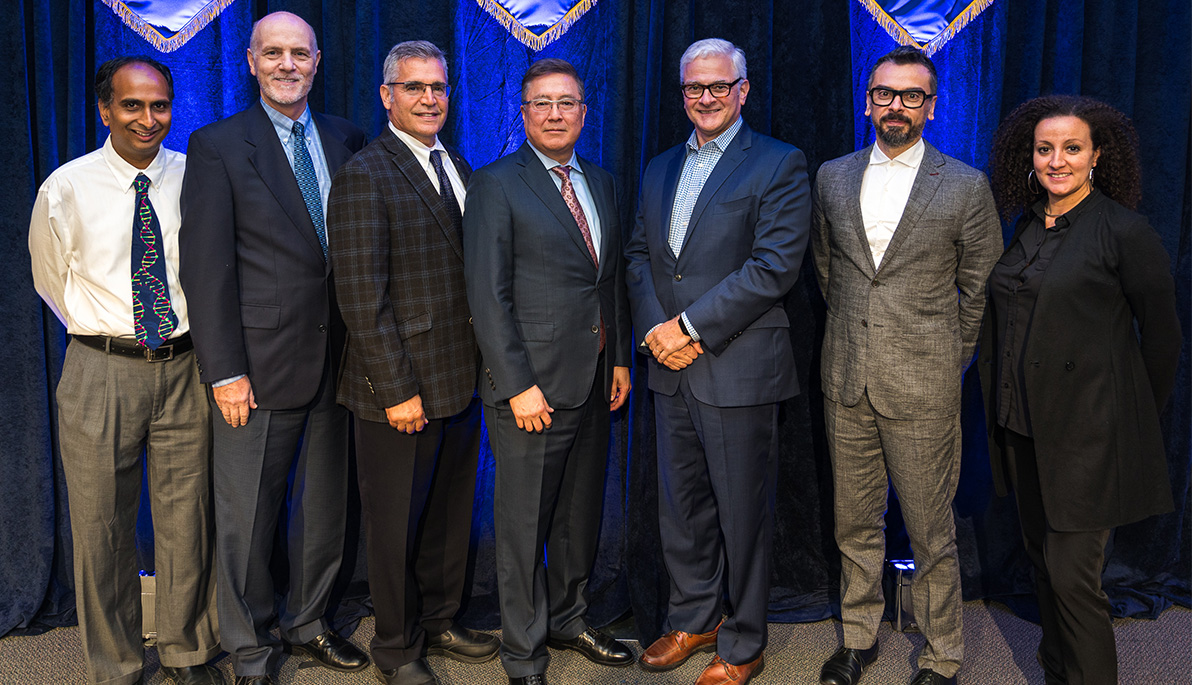News
Faculty Earn Presidential Engagement Awards for Research, Technology, Global Approaches
September 4, 2019
Pictured from left: Navin Pokala, Robert Gallagher, Peter Douris, Junius Gonzales, President Hank Foley, Giovanni Santamaria, and Marcella Del Signore.
Five New York Institute of Technology faculty members dedicated to the engagement of their students in curricular and cocurricular activities were honored at the university’s 2019 faculty and staff convocation on August 29. Presidential Engagement Awards in several categories were presented by New York Tech President Hank Foley, Ph.D., and Provost Junius Gonzales, M.D., M.B.A.
This year’s recipients include:
- Student Engagement by Faculty or Professional Staff in Global Education: Giovanni Santamaria, associate professor of Architecture, School of Architecture and Design
- Student Engagement by Faculty or Professional Staff: Robert Gallagher, M.B.A., D.C., clinical associate professor of Occupational Therapy, School of Health Professions
- Student Engagement in Research and Scholarship: Peter Douris, Ed.D., D.P.T., professor of Physical Therapy, School of Health Professions
- Integration of Technology for Enhancement of Student Learning: Marcella Del Signore, M.Arch., associate professor of Architecture, School of Architecture and Design
- Integration of Technology for Enhancement of Student Learning: Navin Pokala, Ph.D., assistant professor of Biological and Chemical Sciences, College of Arts and Sciences
“Every one of this year’s award winners exemplifies what we aspire to do every day here at New York Tech: to educate and engage future doers, makers, innovators, and inventors to learn new ways of thinking and critical problem solving that will ultimately change the world for the better,” said Foley. “We are very proud to have these individuals as part of our esteemed faculty.”
Awardees were selected by a committee of faculty and administration after nominations were solicited from faculty and staff at all campuses and in all schools and colleges. “These five faculty members rose to the top of the nominee list based on their superior ability to integrate and engage students in solving challenges based on real-world scenarios,” said Gonzales, who expressed his appreciation for the committee’s efforts and diligence in selecting the awardees from an outstanding group of nominees this year. “These awardees’ dedication to student engagement will help us graduate highly skilled individuals ready to enter to the workforce and make a real difference.”
Here are brief summaries of the winners’ award-winning work, described by their respective nominators:
“Giovanni Santamaria is committed to offering global immersive experiences for students and engaging them in local and international industry partnerships, projects, and initiatives. Through high-impact practices, his students tackle issues involving sustainability, post-industrial landscapes, and climate resiliency. These learning experiences afford students international exposure and recognition.”
“Robert Gallagher has been able to improve student engagement inside and outside the classroom through outreach and recruitment initiatives to local high schools and community colleges. He also promotes and markets the Occupational Therapy (OT) program through social media outlets, and in addition serves as an enthusiastic videographer, lab coordinator, communications coordinator, game coordinator, and photographer for the department and his students.”
“Peter Douris engages his student in research when they are part of his class, but he also engages them long after—sometimes even as alumni. He has a passion for research and scholarship, and has been published in 25 peer-reviewed journals with a total of 112 physical therapy students, four physician assistant students and one medical student. He recently completed data collection with seven7 physical therapy students as part of a study to guide curricular changes and stress management skills to improve and sustain healthy lifestyle habits of future physical therapists and other health profession students.”
“Marcella Del Signore has applied methods of engagement by using technology in the classroom practice at all levels of the digital-visualization curriculum. She incorporates digital fabrication technologies as a mode to translate design into making, and her continuous commitment is to foster learning environments where knowledge and processes learned in the classroom become tools for students to become successful future leaders and innovators in their profession.”
“Navin Pokala has redesigned three core biology lab courses into state-of-the-art curriculum: genetics, cell biology, and biochemistry. Since taking on the initiative for modernization, more than 550 students have benefited from new technologies and experimental methods. Pokala has significantly improved the level of engagement, familiarizing students with cutting-edge tools and techniques, and improving their quantitative data analysis and modeling (skills that are in high demand by the biotech industry). It is estimated that approximately 250 students will be impacted each year by his course modernizations.”





